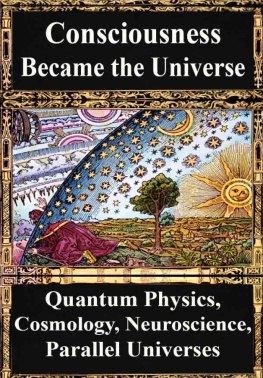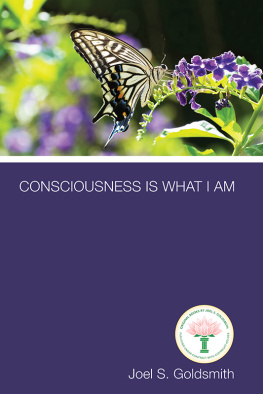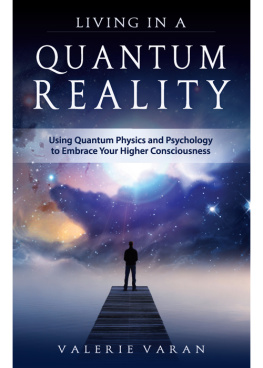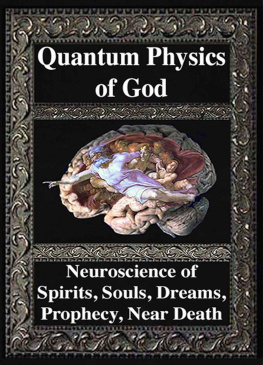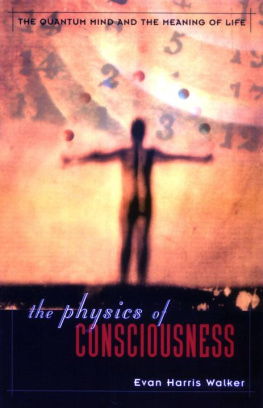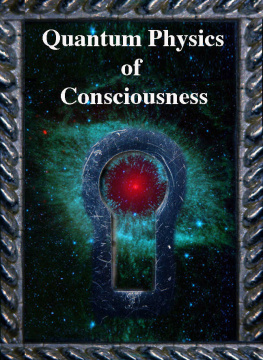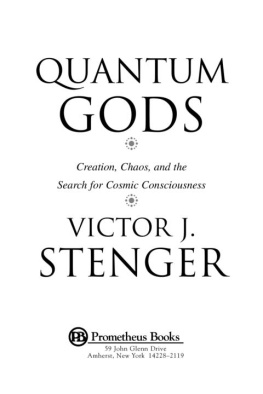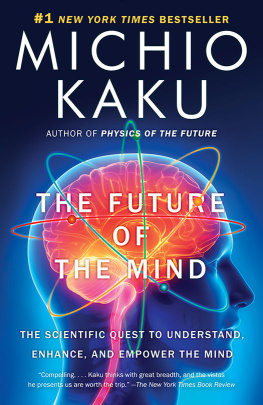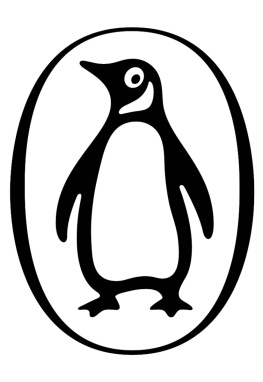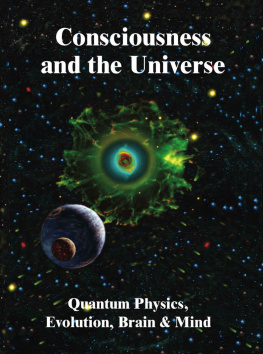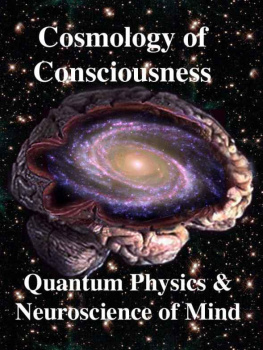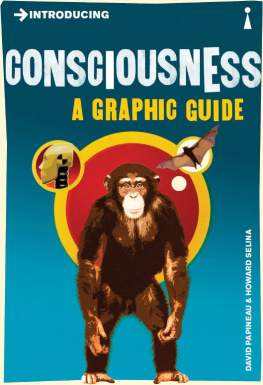
How Consciousness Became the Universe
Quantum Physics, Cosmology,
Relativity, Evolution, Neuroscience, Parallel Universes
Deepak Chopra, Roger Penrose, Henry P. Stapp, Stuart Hameroff, Menas Kafatos, Rudolph E. Tanzi, Subhash Kak, Chris King, Walter J. Christensen Jr., Chris J. S. Clarke, Roger Nelson, Hans Liljenstrm, John Smythies, Andrea Nani, Andrea E. Cavanna, John T. Furey, Vincent J. Fortunato, Steven Bodovitz, Franz Klaus Jansen, Francois Martin, Federico Carminati, Giuliana Galli Carminati, Horace W. Crater, Stan V. McDaniel, Brandon Carter, Michael B. Mensky, Gordon Globus, York H. Dobyns, Shan Gao, Fred Kuttner, Bruce Rosenblum, Michael Nauenberg, Antonella Vannini, Ulisse Di Corpo,
Cosmology Science Publishers, Cambridge, 2015
Copyright 2015
Published by: Cosmology Science Publishers, Cambridge, MA
All rights reserved. This book is protected by copyright. No part of this book may be reproduced in any form or by any means, including photocopying, or utilized in any information storage and retrieval system without permission of the copyright owner.
The publisher has sought to obtain permission from the copyright owners of all materials reproduced. If any copyright owner has been overlooked please contact: Cosmology Science Publishers at Editor@Cosmology.com, so that permission can be formally obtained.
Key Words: Quantum Physics, Relativity, Consciousness, Neuroscience, Brain, Mind, Time Travel, Mental Time Travel,
*********
****************
*********
Contents
*********
****************
*********
I: How Consciousness Became the Universe
*********
****************
*********
1. How Consciousness Becomes the Physical Universe
Menas Kafatos , Rudolph E. Tanzi , Deepak Chopra
Fletcher Jones Endowed Professor in Computational Physics, Schmid College of Science, Chapman University, One University Dr. Orange, California, 92866,
Joseph P. and Rose F. Kennedy Professor of Neurology, Harvard Medical School Genetics and Aging Research Unit Massachusetts General Hospital/Harvard Medical School 114 16th Street Charlestown, MA 02129
The Chopra Center for Wellbeing, Carlsbad, CA 92009
Abstract
Issues related to consciousness in general and human mental processes in particular remain the most difficult problem in science. Progress has been made through the development of quantum theory, which, unlike classical physics, assigns a fundamental role to the act of observation. To arrive at the most critical aspects of consciousness, such as its characteristics and whether it plays an active role in the universe requires us to follow hopeful developments in the intersection of quantum theory, biology, neuroscience and the philosophy of mind. Developments in quantum theory aiming to unify all physical processes have opened the door to a profoundly new vision of the cosmos, where observer, observed, and the act of observation are interlocked. This hints at a science of wholeness, going beyond the purely physical emphasis of current science. Studying the universe as a mechanical conglomerate of parts will not solve the problem of consciousness, because in the quantum view, the parts cease to be measureable distinct entities. The interconnectedness of everything is particularly evident in the non-local interactions of the quantum universe. As such, the very large and the very small are also interconnected. Consciousness and matter are not fundamentally distinct but rather are two complementary aspects of one reality, embracing the micro and macro worlds. This approach of starting from wholeness reveals a practical blueprint for addressing consciousness in more scientific terms.
1. Introduction
We realize that the title of our paper is provocative. It is aimed at providing a theory of how the physical universe and conscious observers can be integrated. We will argue that the current state of affairs in addressing the multifaceted issue of consciousness requires such a theory if science is to evolve and encompass the phenomenon of consciousness. Traditionally, the underlying problem of consciousness has been excluded from science, on one of two grounds. Either it is taken as a given that it has no effect on experimental data, or if consciousness must be addressed, it is considered subjective and therefore unreliable as part of the scientific method. Therefore, our challenge is to include consciousness while still remaining within the methods of science.
Our starting point is physics, which recognizes three broad approaches to studying the physical universe: classical, relativistic, and quantum. Classical Newtonian physics is suitable for most everyday applications, yet its epistemology (method of acquiring knowledge) is limited -- it does not apply at the microscopic level and cannot be used for many cosmic processes. Between them, general relativity applies at the large scale of the universe and quantum theory at the microcosmic level. Despite all the attempts to unify general relativity with quantum theory, the goal is still unreached. Of the three broad approaches, quantum theory has clearly opened the door to the issue of consciousness in the measurement process, while relativity admits that observations from different moving frames would yield different values of quantities. Many of the early founders of quantum mechanics held the view that the participatory role of observation is fundamental and the underlying stuff of the cosmos is processes rather than the construct of some constant, underlying material substance.
However, quantum theory does not say anything specific about the nature of consciousness -- the whole issue is clouded by basic uncertainty over even how to define consciousness. A firm grasp of human mental processes still remains very elusive. We believe that this indicates a deeper problem which scientists in general are reluctant to address: objective science is based on the dichotomy between subject and object; it rests on the implicit assumption that Nature can be studied ad infinitum as an external objective reality. The role of the observer is, at best, secondary, if not entirely irrelevant.
2. Consciousness and Quantum Theory
In our view, it may well be that the subject-object dichotomy is false to begin with and that consciousness is primary in the cosmos, not just an epiphenomenon of physical processes in a nervous system. Accepting this assumption would
turn an exceedingly difficult problem into a very simple one. We will sidestep any precise definition of consciousness, limiting ourselves for now to willful actions on the part of the observer. These actions, of course, are the outcome of specific choices in the mind of the observer. Although some mental actions could be automated, at some point the will of conscious observer(s) sets the whole mechanical aspects of observation in motion.
The issue of observation in QM is central, in the sense that objective reality cannot be disentangled from the act of observation, as the Copenhagen Interpretation (CI) clearly states (cf. Kafatos & Nadeau 2000; Kafatos 2009; Nadeau and Kafatos, 1999; Stapp 1979; Stapp 2004; Stapp 2007). In the words of John A. Wheeler (1981), we live in an observer-participatory universe. The vast majority of todays practicing physicists follow CIs practical prescriptions for quantum phenomena, while still clinging to classical beliefs in observer-independent local, external reality (Kafatos and Nadeau 2000). There is a critical gap between practice and underlying theory. In his Nobel Prize speech of 1932, Werner Heisenberg concluded that the atom has no immediate and direct physical properties at all. If the universes basic building block isnt physical, then the same must hold true in some way for the whole. The universe was doing a vanishing act in Heisenbergs day, and it certainly hasnt become more solid since.
Next page
